Shaji-ki-Dheri
Shaji-ki-Dheri is the site of an ancient Kanishka stupa about 6 kilometers from Peshawar, Pakistan.[1]
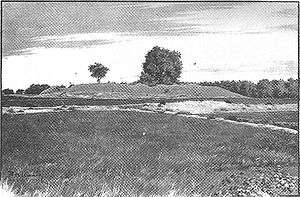
1899 engraving showing the remnants of the Kanishka stupa in Shaji-ki-Dheri.
American archaeologist David Brainard Spooner conducted excavations there in 1908-09 for the Archaeological Survey of India leading to the identification of the Kanishka stupa dated to the 2nd century CE, and the discovery of the Kanishka casket.[2] Spooner published a paper following the excavations: "Excavation at Shaji-ki-dheri: Annual Reports of the Archaeological Survey of India 1908–09".[3]
 Statue of the Buddha, probably Shaji-ki-Dheri.
Statue of the Buddha, probably Shaji-ki-Dheri.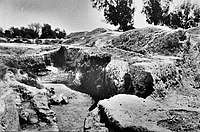 Excavations in 1910.
Excavations in 1910.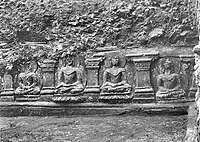 Remains of the stupa.
Remains of the stupa.- Kanishka casket found in the ruins, British Museum.
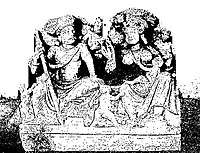
 Jataka of the Bow contest.
Jataka of the Bow contest.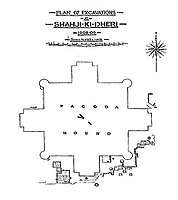 Ground plan of the stupa.
Ground plan of the stupa.
References
- The Grandeur of Gandhara: The Ancient Buddhist Civilization of the Swat, Peshawar, Kabul and Indus Valleys, Rafi U. Samad, Algora Publishing, 2011, p.146
- The Grandeur of Gandhara: The Ancient Buddhist Civilization of the Swat, Peshawar, Kabul and Indus Valleys, Rafi U. Samad, Algora Publishing, 2011, p.146
- The Cambridge World History: Volume 3, Early Cities in Comparative Perspective, 4000 BCE–1200 CE, Norman Yoffee, Cambridge University Press, 2015
This article is issued from Wikipedia. The text is licensed under Creative Commons - Attribution - Sharealike. Additional terms may apply for the media files.